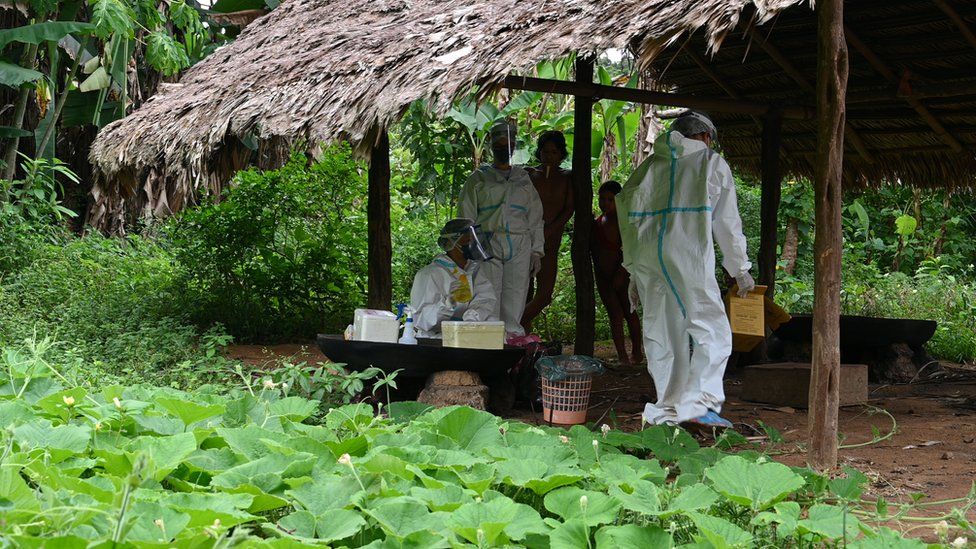Friday, 14 January 2022
Angola wants to strengthen cooperation with Senegal
CAN'2022: Tunisia lose to Mali
Covid-19: Angola records 1,399 recoveries, 759 new cases
Covid: Viral photo highlights challenges of vaccinating Amazon
A photo of an indigenous man carrying his father on his back to take a Covid-19 vaccine in the Brazilian Amazon has gone viral, and became a symbol of the complicated vaccination logistics in one of the world’s most remote areas.
The photo taken by a doctor shows 24-year-old Tawy holding Wahu, 67, after both were given a vaccine dose.
They had to walk for hours through the forest to reach the vaccination site.
Official data say 853 indigenous people have died with Covid-19 in the country.
But indigenous rights groups say that number is much higher. A survey by Apib, a Brazilian NGO, said 1,000 indigenous people had died between March 2020 and March 2021 alone.
Tawy and Wahu belong to the Zo’e indigenous community, which has around 325 members. They live in relative isolation across dozens of villages in an area equivalent to 1.2 million football fields in the northern Pará state.
Erik Jennings Simões, the doctor who took the picture, said Wahu could hardly see anything and walked with difficulty because of chronic urinary problems. He estimated that Tawy carried his father on his back for five to six hours.
“It was a very beautiful demonstration of the lovely relationship between them”, Dr Simões told BBC News Brasil.
The picture was taken in January 2021, at the start of the Covid-19 vaccination campaign in Brazil, one of world’s hardest-hit countries by the pandemic. But Dr Simões only shared it on Instagram on 1 January of this year, to send a “positive message at the beginning of the new year”.
 IMAGE SOURCE,SESAI
IMAGE SOURCE,SESAIWhen vaccination against Covid-19 began in Brazil, indigenous people were considered a priority group. For the health team accompanying the Zo’e, a challenge emerged: it would be unfeasible for the agents to go to each village, as it would take weeks to vaccinate everyone, due to how spread out they were.
So they set up huts in the forest, and a vaccination system was agreed with the communities through a radio. “We’ve adopted practices that respect and take into account the culture and knowledge of the Zo’é people,” Dr Simões said.
- CONTEXT: ‘Everything you should not do, Brazil has done’
- IN CHARTS: Tracking the pandemic
Last September, Wahu died for reasons that remain unclear. Tawy remains with his family and has recently taken his third vaccine dose.
……………………………………………………………
South Africa minister tells schoolgirls to ‘open books and close legs’
A regional health minister has come under fire in South Africa for telling schoolgirls to “open your books and close your legs”.
Phophi Ramathuba made the comment during a visit to a secondary school in a bid to encourage abstinence and reduce teenage pregnancy rates.
Social media users criticised the remark and questioned why it was only directed at girls.
Ms Ramathuba defended the message, which she said was aimed at boys too.
The health minister for Limpopo province was visiting Gwenane secondary school in the township of Sekgakgapeng on Wednesday to mark the first day of the new academic year.
“To the girl child I say: Open your books, and close your legs. Don’t open your legs, open your books. Thank you very much,” she told students.
She added that girls were being lured by older men using luxuries like expensive wigs and smart phones.
The comments sparked criticism after a video of the speech was shared on social media.
“This is not an appropriate way to talk to kids about abuse, sex and consent”, one social media user wrote.
Opposition politician Siviwe Gwarube called the remarks “deeply problematic”.
“This was an opportunity to have a meaningful conversation with these learners about consent… Instead you victim blame. Place undue pressure on girls”, she said in a message on Twitter.
Ms Ramathuba told South African news site TimesLIVE that her statement had been taken out of context, and was directed at boys too.
“I told the boys to focus on their education and not sleep with girls,” she said.
She added that her constituents in Limpopo “appreciated the message”.
“They were even saying that they were afraid to say these things and thanked me for calling a spade a spade,” she said.
Government statistics show that almost 33,400 girls under the age of 17 gave birth in South Africa in 2020.
Save the Children says a lack of access to comprehensive sex education as well as affordable and appropriate health services are key factors contributing to teen pregnancies in South Africa.
…………………………………………………………
A Royal Encounter at Madame Tussauds London - Part 7
Exploring the Majesty of the Palace and Its Distinguished Guests Greetings, ladies and gentlemen! My name is Sofonie Dala, and I am deligh...

-
Since the July 26 coup, Niger has become the latest hotbed of disinformation in the troubled Sahel region as West African powers grapple wit...
-
Angolan President of Republic João Lourenço marked Saturday (26) the third year of his five-year in office, marked by the strong negative ...
-
Celebrating Purpose, Passion & Powerful Public Engagements! Dear Changemakers, As we reach the midpoint of 2025, we’re thrilled to sha...




